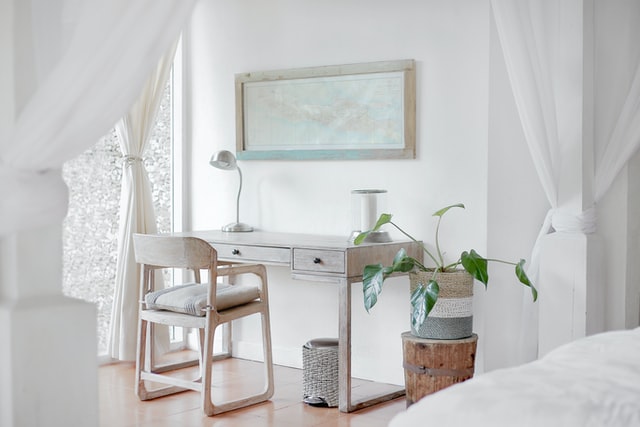Some of today’s most prominent businesses were started at home, and many of today’s successful business owners are content to operate their businesses from their home office, garage, or on-site warehouse.
A small business may be defined as a “privately owned corporation, partnership, or sole proprietorship with fewer employees and less annual revenue than a corporation or regular-sized business.” Therefore, a small home business can be defined as such; only its operation occurs at the proprietor’s residence or in the residential setting of one of the employees.
Many people decide to start a small home business to earn extra income or simply to go into business for themselves. Many small businesses are run from homes today, ranging from financial consulting and baking to salon services and tutoring. Whether you’re interested in selling products or providing services from your home, the following information will help you get started and know some pros and cons. Of course, if you have little ones at home, starting a business alongside them can be a challenge – but not impossible! Parenting while working from home can actually be enjoyable, while also setting a positive example for your children to learn from.
Benefits and Advantages of a Home-Based Business

If you’re thinking about launching a home business, you’ll want to explore the many enjoyable advantages and benefits. In fact, many of these benefits persuade people to start a home business in the first place.
Time with Family
Many people prefer to work from home so that they can be around for the family. Small business owners can be on-site to keep an eye on older relatives who may need occasional assistance. They can be at home when children are let out of school, and they can enjoy flexible hours to quickly leave home and attend kids’ events like after-school track meets or basketball games. Even if you are a “pet parent,” staying at home jobs or starting your own business will be ideal for taking care and sharing more time with the people you love or your furry loved ones.
Zero Commute Time
The average American spends an hour per day commuting to and from work. That adds up to 20 hours per week. Many people spend even more time commuting, enduring the stress of heavy traffic, inclement weather, and crowded busses or trains. There is also the substantial cost associated with work commutes. Being at home will reduce these extra costs since you will be able to cook and eat at home, avoid traffic, lower your gas budget or any other transportation budget. This would be the perfect time to start eating clean and having a healthy diet, adding more activities that will keep you productive such as meditating instead of being stuck in traffic.
Save on Commercial Rent
When you run your business from home, you can save the cost of rent. If you operate your business in a commercial space, you’d be required to pay rent as well as utilities and insurance. You can avoid this type of overhead by operating your business online from your home. You can reinvest the money you save on commercial rent back into your business in some other form, such as digital marketing.
Multitask between Your Professional and Personal Lives
While it may take some practice to juggle tasks associated with your business and personal life skillfully, you can undoubtedly multitask when running a home business. You can break from your work to throw in a load of laundry or prep for dinner on your lunch break. You can create a daily dynamic schedule that includes tasks related to your business and household needs. Moreover, you may easily fit a wide range of tasks into your day without the commute time, such as exercising.
Be More Productive
Because your business belongs to you, you’re likely to feel a tremendous investment in its success. So, you’re apt to work hard and be highly productive. Moreover, there won’t be any other employees (unless you decide to hire them) or a boss around to distract you from your tasks. Consequently, you can more easily stick to your workday plans. When you run your own business, you can set your own goals in terms of productivity and develop the strategies to achieve them that work best for you. A great way to get started would be creating a schedule you know you will follow every day. It must have realistic metrics so you can stay motivated throughout this new journey. While making your schedule, you might want to add some household activities that might take around 15 minutes to complete or maybe just take an outdoor walk or read that book you have purchased and haven’t had the chance to open it—organizing your agenda and working at home will a great experience. It doesn’t matter if you are a morning or evening person.
Getting Started

Starting a business is an exciting prospect, but there are a lot of details to address. By staying organized and tackling all necessary tasks, you can set your business up for a successful launch.
Define Your Business
Take time to define your business clearly. Will you sell products, services, or both? Although you may already have a good idea of what you want to do, you’ll want to think in terms of specifics once you’re serious about starting a small home business. Take time to brainstorm through some ideas and make a list of the possibilities you’re most interested in pursuing. Once you have a shortlist, you can research your options and take a look at the marketplace to determine if there’s a need for your offerings. Take into consideration also what are you good at, baking, cooking, singing, tutoring, numbers, dropshipping etc. this will help you to keep motivated and have a business project that you will enjoy and won’t see it like a boring work task that you just have to perform.
Brainstorm Your Business Name
Take time to choose a business name carefully. You’ll want to choose a name that’s easy for customers to spell and remember. It makes sense to select a web-friendly name in this digital age and nothing too similar to your competitors’ names. While there are business name-generating apps available that you can try, you might also want to make a list of possible names for your business and run them past family and friends to get their thoughts. You can even ask your close friends and family to suggest options as a way of helping you brainstorm.
Identify Your Target Audience
Who are you trying to sell to? Defining your target audience, whether it’s local homeowners or teenagers nationwide, will help you market your business effectively. When you have a target demographic in mind, you can create more targeted strategies for engaging potential customers. Therefore, you must identify your product or service’s target audience before you begin marketing efforts for the brand. The group will include existing customers as well as potential customers.
Your target market does not necessarily consist of everyone who may be interested in your products. It’s important to identify the people you want to reach through your brand marketing efforts, whether you’re using digital marketing campaigns or advertisements or on social media channels.
Understanding your target audience and their pain points allows you to create content more effectively and target advertisements with the right marketing message for each segment.
Develop Your Business Plan
Creating a business plan is a crucial step for developing your home business. It can include every aspect of your business, guiding both its launch and operation. Some key elements of your business plan should include:
- Company description: provide a summary of what your company does. Company descriptions give an overview of key aspects of your business, such as what you do and what sets you apart from the competition. Your business description should clearly explain what you do.
- Breakdown of your products and services: The product or service section of your business plan should emphasize the value you offer clients or customers.
- Executive summary: provide a formal business summary, one that could appear in professional business directories.
- Marketing and sales plan: describe how you intend to market your company (i.e., digital and traditional sales measures)
- Competitive analysis: analyze the marketplace you intend to operate in; know how you fit in and who your competitors are.
- Operating plan: describe how you plan to run your business and list company departments and managing personnel.
Financial Considerations
You’ll need to carefully evaluate your finances and develop a budget related to your startup expenses and business operation. Don’t forget to add in costs for items like marketing, insurance, and other necessities associated with the types of products or services you’ll sell. Determine whether or not you’ll need to apply for a business loan. For entrepreneurs who are starting new businesses, personally funded venture capital is often the first thing they consider. While this is common at the beginning, it is essential to separate your personal and professional funds when your business is growing and earning cash, not only for tax purposes but also to protect your credit and eliminate unnecessary stress.
Legal Business Structure
Take time to determine your business’s legal stature and structure. Do you intend to own your business as a private proprietor or to create a corporation? Learn about the different structures and decide which is best suited for you and your business.
Business Licensure
What type of license will you need to operate your business? Be sure to calculate the cost of your license into your startup costs. Although there are general business licenses, there are also specialty licenses that may apply to your business. Check here to learn more about specific types of business licenses.
Branding Campaign
Marketing is essential for any business but definitely a home business. You won’t have the benefit of being in a commercial area where you can post commercial signage. You’ll need to create a marketing plan that includes both traditional and digital marketing initiatives. Branding is the idea that if you display a positive message about your company to enough people for long enough, they’ll think about you when it’s time to make a purchase.
Home-Based Business Ideas

People create many types of businesses to operate from home. We’ll cover some of the most popular ideas here:
Virtual / In-Person Teacher
- Music teacher: teach an instrument such as guitar, violin, or piano. Plan to offer your services on different teaching platforms and offer private lessons as well as group lessons.
- Dance teacher: teach modern dance, ballet, or ballroom dancing. Offer different types of schedules for kids and adults. It is important you have all the proper equipment so your online lessons look highly professional.
- Art teacher: teach drawing and illustration, painting, or sculpture. Define which are technique you are best at and create a schedule of all the different hours available you have.
- Language instructor: teach Spanish, Chinese, Latin, or French. Be sure you completely dominate the language you are planning to teach.
- Tutor: Tutor either elementary or high school students in subjects that you are degreed in, such as math, English, or chemistry.
- Yoga instructor: teach virtual yoga and meditation techniques.
E-commerce Seller
You can operate an e-commerce company from your home. You can purchase products in bulk and sell them online. You’ll partner with a warehouse where your products will be shipped from. You can also perform all services related to e-commerce and expand as you need to. When choosing products, consider how much space you’ll need to accommodate this type of operation.
Homemade Products
Many home-based business owners sell products that they create, such as:
- Candles: A candle company may be the best business for anyone passionate about wicks, soy blends, and achieving the perfect scent. You can offer soy candles, scented candles, beeswax candles, paraffin candles, and more.
- Baked goods: Bakeries have been around for a long time, but recently they have grown in popularity. Entrepreneurs have taken their cakes, cupcakes, and cookies from home and open regular bakeries and restaurants, and even franchises that make. Creating cupcakes, artisan bread, cookies, wedding cakes, and more could be a great way to start.
- Jewelry: Making people’s personalities come alive through jewelry is a very fulfilling creative pursuit. Think about creating beaded bracelets, necklaces, earrings, rings. etc.
- Essential oils offer many opportunities for creativity and reward. Own a business or buy wholesale oils to resell on your own.
- A lot of people know how to knit, but it’s generally considered a new fad or a lost art. It’s not clear to them how to make money with it. You can start by creating hats, scarves, mittens, or sweaters.
Services
You may base your business on providing services to customers either in person or online depending on the services you offer, which might include:
- Makeup tutorials: Teaching how to properly use makeup and providing some confidence tips might be a loving activity, not only for you but also for your potential clients. Even showing how to apply lashes properly would be a great way to get started.
- Dog walking: Taking care of furry babies and just having a long walk outdoors could definitely bring you great benefits.
- Personal trainer: While training for your own personal goals, you are also helping others to achieve theirs.
- Virtual assistant: if organizing and scheduling your day is a passion of yours, you should definitely offer these services to people that don’t have that same passion or patience as you do.
- Clients of personal shoppers usually buy clothing and accessories for themselves. A personal shopper may work directly for a client or their stylist; other personal shopper employment is available through boutiques and departments stores.
- Housecleaner: This is a great opportunity if you are passionate about cleaning and decluttering. These services have a high demand.
- A curious fact, Recently India has become the hotspot for foreigners for starting an Indian Subsidiary and Ebizfiling is one-stop solution for a Company Registration in India by a foreigner. Know the benefits of starting a business in India.
Home Office Essentials

When developing your business, you’ll want to create a home office where you can ‘set up shop’ and manage all the important aspects of operating your business. Here are some home office essentials to consider:
Good Lighting
Be sure that you have good lighting so that you can work without straining your eyes. You may want to have better overhead lighting installed by an electrician. Or, you can add more lamps to the space to ensure that you have great lighting even on dark and dreary days.
Adjustable Desk
An adjustable desk is ideal for a home office. You can use your desk for various tasks that may be related to your business. A standup desk is also a great feature if you’re concerned about fitness. You’ll burn more calories by standing up to work.
Comfortable Furniture
Try to invest in a quality ergonomic office chair. You’ll be spending a lot of time in your home office, so be sure to have comfortable and supportive furnishings for yourself and anyone else who may be working with you. You may also need filing cabinets, a workbench, or other furnishings related to the type of work you perform.
Decor
Office decor may not seem essential, but it can enhance your mood each day. Remember, your office is your place of work. Decorate it in a way that inspires and motivates you to be productive. Although you don’t want to add much in the way of clutter, some thoughtful decorative pieces will add personal warmth to your office.
Plants
House plants can make your home office feel cozy and welcoming. However, that’s not all. Many houseplants feature air-purifying properties. Add plants to your office space like aloe vera or spider plants to keep the air smelling clean and fresh. Consider plants of various sizes to add a dynamic look to the space.
Equipment
You’ll likely need basic office equipment and may require other equipment or gear related to your products or services. For instance, if you perform sewing services, you will need a high-quality sewing machine. Typically, you’ll need office equipment such as:
- Computer or laptop
- Internet (consider business internet service) pocket wifi could also be a great option.
- Printer
- Copy machine
- Headphones
- Adding machine/calculator
- Postage scale
These are just a few ideas. You’ll need to brainstorm to ensure you have all the equipment you need for your operation.
Quiet Space
When laying out your office, be sure to choose a space with an adequate room as well as an area where you can work without interruption. If you live in a bustling household, you’ll need a place where you can work without distractions. A quiet space away from children or the television room would be ideal.
Office Bar
Although you can always visit your kitchen, you might want to create an office bar where you have a coffee maker, healthy snacks, and even a small refrigerator to keep water or other beverages cold. This way, you can keep your work items separate from the household’s supplies.
Use these tips to create your home business. Be sure to give yourself adequate time to address each aspect of your business’s development. Once your business is up and rolling, you’ll also want to consult with an accountant to ensure that you understand your tax obligations.
Author: Isabella Caprario
Read more of our blog articles on our news blog.




More Financial News & Events
Learn Hacks to Help You Build Your Wealth!
Aug
Video – Learn About Regulatory Compliance and Operations with Parthik Mehta!
Jun
BTS with the Sales and Administrative Department at TJP!
Jun
Video – Get to Know Jin Lee, one of TJP’s Financial Planners!
Jun
Video – What Does Financial Happiness Mean for Business Owners_
Jun
Video – How Do Retirees Define Financial Happiness & Habits to Maximize Their Finances
May
Conquer Tax Season With the Right Bookkeeper!
May
Video – How Does Money Tie Into Personal Happiness
May
Video – What Can You Do to Cultivate Your Financial Freedom
May
Exploring Financial and Emotional Resilience
Mindshift Mastery and Emotional Resilience
Creating a mentor mindset: How to become one or find one
Jan
Legal Financial Fitness: A Comprehensive Checklist for Thriving Practices
Jan
How to Mentally and Financially Prepare for a Layoff
Jan
2023 tax considerations you may have missed
Dec
How to Hold on to More of Your Cash this Holiday Season
Dec
Financial Moves to Make Before Year End
Dec
Navigating Stagflation: Financial Resilience in Uncertain Times
Nov
Buying and selling real estate amidst inflation
Nov
Navigating the Changing Tides: Real Estate, Inflation, and Rising Mortgage Rates
Nov
How does inflation affect your financial plan?
Nov
Caring for aging parents: The journey and lessons learned along the way
Oct
Resources For managing care for Aging Parents
Oct
Talking to Aging Parents About Finances
Oct
Living your best life: Infusing your best life into your your everyday
Oct
Living your best life: Striking the balance between enjoying life now or enjoying it later
Sep
Living Your Best Life: Client Testimonials and Insights
Sep
Unpacking FOMO: Understanding biases, emotions and financial attitudes
Aug
How to overcome FOMO to not overspend this summer
Aug
How to Overcome FOMO on Investments
Aug
What behaviours undermine your ability to build wealth
Jul
How Do You Loose Wealth
Jul
What Does Wealth Building Mean to Our Clients?
Jul
Estate Planning: What You Can Learn From the Mistakes of Celebrities
Jun
Estate Planning For Lawyers
Jun
Estate Planning for Business Owners
Jun
Managing growth for business owners
May
Are you a lawyer with questions on how to grow your investments?
May
Cultivating a growth mindset around money
May
Why financial growth can be deceptive
May
Home and Financial Document Organization
Apr
Business owners, it’s time to start spring cleaning.
Apr
Spring Cleaning Your Finances
Apr
Unique financial challenges female lawyers face
Mar
Taking Action: A Woman’s Perspective on Deciding To Tackle Her Finances
Mar
Is there a gap in your income protection?
Mar
Knowing the difference between Tax Filer and Tax Advisor
Mar
Conquering Women’s Fears Around Finances
Mar
Trends in Family Law
Feb
PART 2: Financial Conversations Couples Need To Have at Different Life Stages
Feb